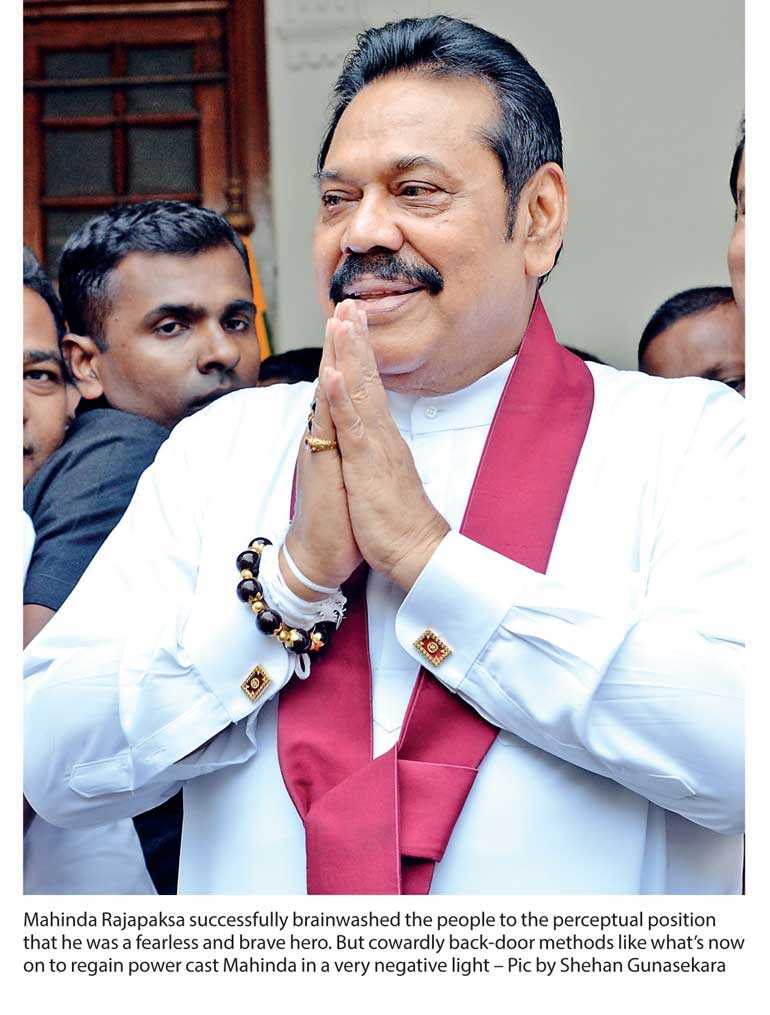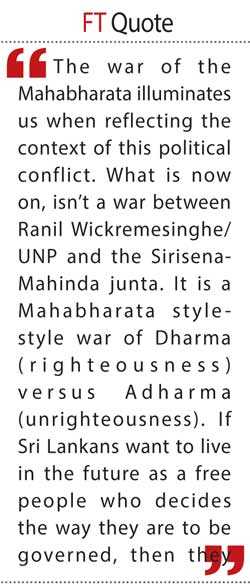Saturday Feb 21, 2026
Saturday Feb 21, 2026
Friday, 2 November 2018 00:00 - - {{hitsCtrl.values.hits}}

Protest
Unlike the last three years of Yahapalana governance, when the media was set free to criticise, domestic Sri Lankans could not view over their favourite TV channels the massive, consuming and raging firepower of mass collective that assembled at Kollupitiya.

With short notice and sans any paid attendance whatsoever, nearly 100,000 are said to have gathered and roared there in the precincts of Temple Trees. It was to protest against the unrighteousness or adharma of the coup junta of Sirisena-Mahinda who on the dark night of 26 October had unlawfully pushed out the current Prime Minister, Ranil Wickremesinghe, and replaced the latter with the former President whom 6.2 million voters had kicked out of office – lock, stock and barrel in the year 2015.
That people’s victory was all the more important because it had taken place despite the total and outrageous abuse of incumbent power by Mahinda Rajapaksa and the corrupt brigade that formed his government.
The war of the Mahabharata
What we observed in Kollupitiya was an unmistakable and impressive manifestation of a kind of battle reminiscent of the classic war related in the Mahabharata – one of the most important epics of Hindu India. That war was fought between the Pandavas and Kauravas at Kurukshetra, present day Haryana.
Arjuna was the great Prince of the Pandavas. Bishma was his counterpart from the Kaurava army. Bhishma was Arjuna’s uncle in whose lap he had virtually played as a kid. When it came to a point of attack, Arjuna was overwhelmed by the fact of that blood relationship, withdrew, and went up to God Krishna for advice.
Krishna’s response was to remind Arjuna that this is not a mere war between two sides but a war of righteousness (Pandavas) versus unrighteousness (Kauravas); therefore, he has no choice but to fight for righteousness. The Bhagwadgita relates the conversation between Arjuna and the God.
The war of the Mahabharata illuminates us when reflecting the context of this political conflict. What is now on, isn’t a war between Ranil Wickremesinghe /UNP and the Sirisena-Mahinda junta. It is a Mahabharata style-war of Dharma (righteousness) versus Adharma (unrighteousness.) If Sri Lankans want to live in the future as a free people who decide the way they are to be governed, then they have no option but to join the forces of justice or Dharma.
Junta coup
The unrighteousness of what the cabal did on the night of last Friday 26 October just hits any rational and impartial man in the head. It wasn’t a done thing by any standards of ethical politics. Ethical politics, one may say, isn’t any more operative in Sri Lanka, Paradise, when considering the numerous liars, cheats, robbers, money launderers, murderers, heroin dealers and so on among the politicians or pollies over there today. Yet, there lives on in the public collective consciousness the fundamental principle that defines a civilised nation.
The high-time rogues and black men of the decade-old previous regime were decisively beaten in the elections in 2015 by a nominated common candidate of the other side of the divide. The broad civil movement led by an outraged Venerable monk of high integrity – Rev. Maduluwave Sobitha – decided to come to an agreement with Ranil Wickremesinghe, Leader of the UNP, to back a common candidate. 
Sirisena’s name had been proposed by Chandrika Bandaranaike Kumaratunga, former President and leader of the SLFP, Sri Lanka’s other major party. Ranil agreed and the entire apparatus of the Grand Old Party (UNP) spread far and wide was mobilised to put Sirisena in the seat of power. The UNP is Sri Lanka’s largest single party and it has been a most stable outfit for 71years.
Like in a bad fable, the Rajapaksa forces quietly crept into the good books of Sirisena and poisoned the latter who isn’t known very much for his wit but only for his unique capacity for treachery. Maithripala Sirisena loves betrayal. He betrayed thrice in his political career spanning 40 years.
First, he betrayed his former leader and former President Mahinda Rajapaksa; second, he betrayed Ranil Wickremesinghe and his UNP; third, and now, he betrayed the Sri Lanka Constitution with its democratic process embedded therein. Sirisena tried once to oust Wickremesinghe by promoting a no-confidence motion against the latter.
Mahinda went about openly acknowledging that Sirisena had sought his help to oust Ranil. Sirisena, who soon after victory stated that Mahinda would have murdered him and buried him six feet under had the common candidate attempt failed, has by now found common ground with the former President. Your enemy can be your best friend.
Betrayal of the Constitution
And so, on that dreadful night the Sirisena-Mahinda cabal contrived a coup against the provisions of the Constitution. The Constitution clearly states in its 19th Amendment that the President could not, like in the days of Rajapaksa, any longer arbitrarily dismiss the Prime Minister. That required a passage of a motion by Parliament, which if successful, the PM and Government both go out together.
The rationale of the 19th Amendment was to bring the President even partially under the Parliament until the latter office is wholly made nominal with the completion of a new constitution. The abolition of the Executive Presidency was the main election demand in 2015 and so the new Government had to oblige by bringing in halfway legislation that gives effect to that mandate.
19th Amendment as a smart act
Ranil Wickremesinghe’s sense of quick vision was demonstrated when he hurriedly rolled in the 19th Amendment in the heat of the election victory. Sirisena and a Parliamentary two-thirds was in mood to approve the new legislation. It went through. Had that not been done, then Sirisena would have dismissed the Prime Minister and Government many times by now. As things prevail, both President Sirisena and the Joint Opposition of Mahinda are bowled out. Any judicial test of this flagrant violation would, surely, reaffirm our position.
In fact, if Sirisena-Mahinda chose to, they would have referred the matter to the courts before their outrageous act of violation. Surely, they had foolish pundits like the former Law Professor, now widely known as ‘Ugath Modaya’ (learned fool). They didn’t do that because they knew the result beforehand. For the same reason, they didn’t think of taking the issue before Parliament.
Cowardice of an anti-hero
This implies an act of political cowardice. Mahinda Rajapaksa did successfully brainwash the people to the perceptual position that he was a fearless and brave hero. He did this by monopolising the war victory and jailing the blood-stained General on framed-up charges. Since that, he employed mass media to develop the myth of his heroism. Remember the ‘Maharajaneni’ song? The foolish people gulped the myth and it still lives on.
On the other hand, cowardly back-door methods like what’s now on to regain power, cast Mahinda in a very negative light. His heroism isn’t really there when put to the test. The heroic public myth would have expected Mahinda to tell Sirisena that he will opt for elections, fight that, and win back power instead of resorting to this cheap and third rate spiritlessness. Mahinda Rajapaksa is now not a hero but an anti-hero.
Proroguing Parliament unethical
The evident lack of numbers in Parliament for the junta prompted President Sirisena to prorogue Parliament for a long one-month period. Even to the ordinary man in the street it is clear that this is done to overcome the numbers deficiency by bribing MPs from the UNP side to crossover.
It is widely reported that Mahinda Rajapaksa’s rich sibling, Basil, is going round offering portfolios and big money to hungry MPs. Four numbers have already come over, and that includes the former high profile Minister Wijeyadasa Rajapakshe.
Wijeyadasa is not in need of money but a portfolio can help him in his astrologer-inspired desire to be president someday. He spins his way with utterly dishonest arguments justifying what has happened. He did figure in questionable situations in the Avant-Garde episode. Social media is still rife with pictures of his close meetings in the home of the chief suspect. In all these pics, Wijeyadasa appears slithery and slimy. Like most political serpents, this man can get away with a remarkable fluency and deceptive charm of manner.
More ministries will be created to accommodate more political turncoats. A Ministry for sugar again? A Ministry for potatoes? For kerosene? For massage parlours?
(The writer can be reached via [email protected].)